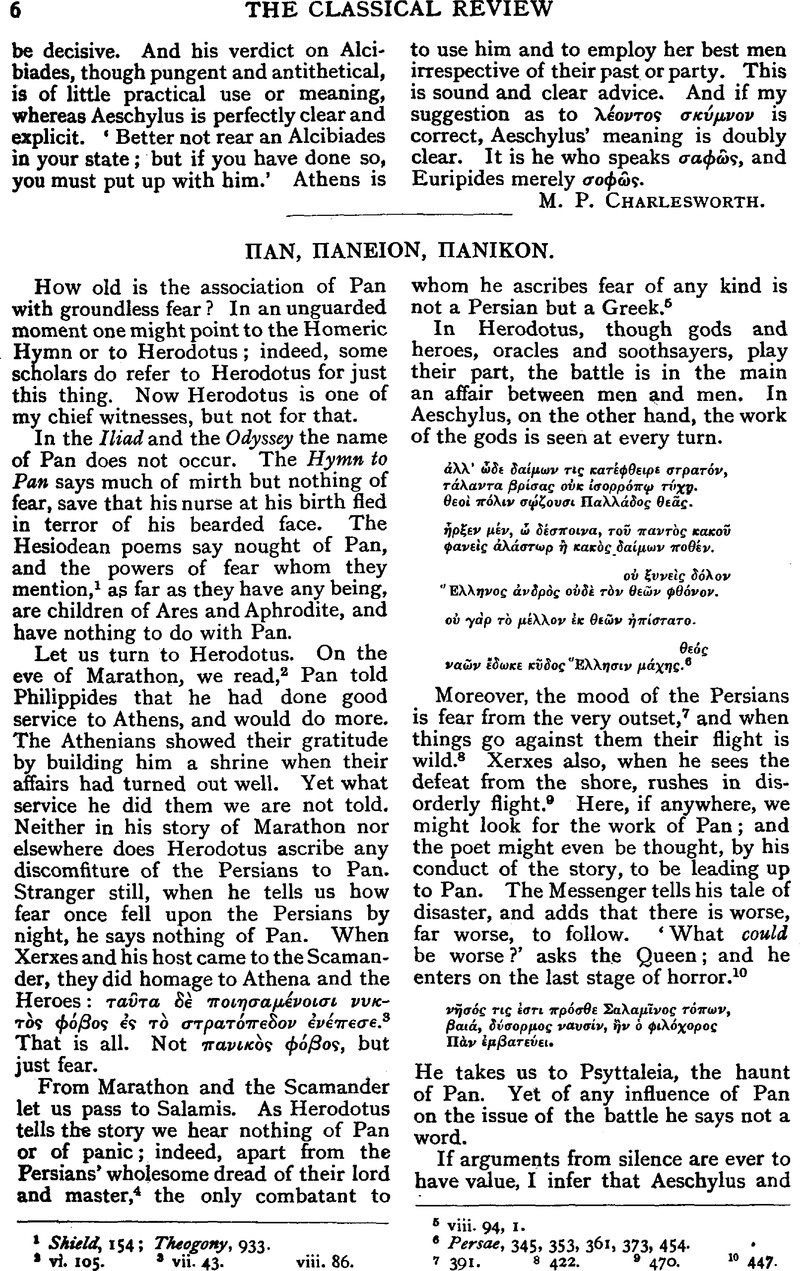Article contents
Abstract

- Type
- Review Articles
- Information
- Copyright
- Copyright © The Classical Association 1926
References
page 6 note 1 Shield, 154; Theogony, 933.
page 6 note 2 vi. 105.
page 6 note 3 vii. 43.
page 6 note 4 viii. 86.
page 6 note 5 viii. 94, 1.
page 6 note 6 Persae, 345, 353, 361, 373, 454.
page 6 note 7 391.
page 6 note 8 422.
page 6 note 9 470.
page 6 note 10 447.
page 7 note 1 The Simonidean epigram (Anth. Plan. 232) supposes Pan to have aided Athens at Marathon, as Μιλτι⋯δης shows ; so do Theaetetus in the following poem (233), Lucian (Philops. 3, Bis Acc. 9, Deor. Dial. 22.3), Pausanias (i. 28. cf. viii. 54. 6), Libanius (v. 40, xxx. 32), and Nonnus (Dionys. xxvii. 299 ff.). So far as know, only a scholion on Sophocles (Ajax 695) suggests that he played his part at Salamis. Even Plutarch's story of the fight on Psyttaleia (Artistid. ix.) says nothing of Pan. The pseudotheocritean Syrinx (9–10) does not commit itself to a place. None of these passages suggests that Pan struck panic into the foe.—Eratosthenes, it seems, made Pan strike ‘ terrorem qui πανικ⋯ς dicitur ’ into the Titans in their iight with the Gods (Hygin. Astron. ii. 25) ; and in Polyaenus (Strat. i. 2) Pan, as the στρατηγ⋯ς of Dionysus, frightens the enemy by a ruse, whence ![]() .
.
page 7 note 2 iv. 125. 1; vii. 80. 3. W. Schmid (Rhein. Mus., 1895, p. 311) has no doubt that Thucydides in both places is combating the ascription of such terrors to Pan. If a similar inference to be drawn from every sententious passage of Thucydides, there will be a god under every stone.—Xenophon does not seem to help. He does not mention in any terms (Hell. ii. 4) the ![]() which in Diodorus (xiv. 32. 3) comes upon the troops of the Thirty before Phyle.
which in Diodorus (xiv. 32. 3) comes upon the troops of the Thirty before Phyle.
page 7 note 3 1172.
page 7 note 4 142.
page 7 note 5 34.
page 7 note 6 An earlier instance of the noun, if we can trust Athenaeus (389 f), is Περ⋯ το⋯ Πανικ∘⋯, the title of a treatise of Clearchus, a disciple of Aristotle. This treatise is otherwise unknown, and what Athenaeus quotes, though it might have served by way of illustration in a scientific account of panics, resembles what he quotes from another treatise by Clearchus in 393a. This, and the singular, throw doubt on Περ⋯ το⋯ Πανικο⋯.
page 7 note 7 De Iside et Osiride 14 (356D). Compare Pausanias x. 23. 7.
page 8 note 1 700E.
page 8 note 2 Ag. 284.
page 8 note 3 Ion 195. See also 1294, and fr. 90 (N.).
page 8 note 4 Read ![]() .
.
page 8 note 5 Since Antigonus Gonatas is much later than Aeneas, I need not consider the suppositions that panic helped him to defeat the Gauls at Lysimachia, and that this panic came into the hymn of Aratus in praise of Pan (Usener, H., Kleine Schriften, iii, pp. 405 ff.Google Scholar ; Tarn, W. W., Antigonos Gonatas, pp. 165, 174)Google Scholar. Justin, who alone gives us details of the fight, says nothing of panic or of Pan.
- 1
- Cited by


